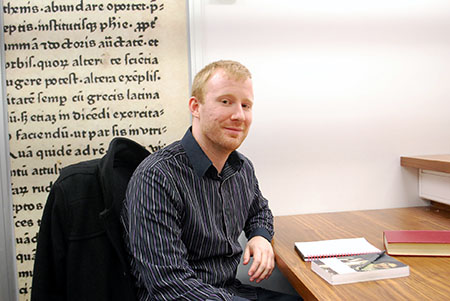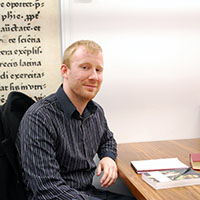 Lee Rooney is in the fourth year of his PhD, and is due to submit his thesis at the end of September. His research project is investigating prophecy in Shakespeare’s English History plays.
Lee Rooney is in the fourth year of his PhD, and is due to submit his thesis at the end of September. His research project is investigating prophecy in Shakespeare’s English History plays.
“I focus in on the eight plays that comprise the two tetralogies. The first tetralogy consists of Henry VI, parts one, two, and three; and Richard III; and the second tetralogy consists of Richard II; Henry IV, parts one and two; and Henry V. They are not all of the English histories but a group of plays thought to have interconnected meanings.
Critics often consider these plays pieces of historical writing, as well as works of drama. What is so fascinating about prophecy to me is that alongside offering a means of organizing and understanding history, it possesses the potential to perform various structural and symbolic roles in drama itself.
History as subject matter and drama as history
It bridges the gap between history as subject matter and drama as history, reconstructed and re-enacted in the theatre. What I am attempting to do is to show that prophecy was central, not only to Shakespeare’s historical thinking, but to his dramatic technique. Shakespeare thinks about history and drama through prophecy.
What I am trying to do is free prophecy from the ideological weight that has been imposed on it by some critics, and to think of it as a dramatic tool available to Shakespeare as a playwright, as well as something that has ideological significance. I cannot ignore its social and cultural value outside of the theatre but I am quite interested in the way it works as a theatrical device.
I am hoping to go into academia and a PhD is a necessary requirement. I am hoping it will lead to a teaching post, perhaps even at this University if the opportunity arises. I would like to be in a stable position teaching and researching at a research-led university. I think that is every prospective academic’s dream.
Sense of community
There have been plenty of lows, but I do not think anybody goes through a PhD without experiencing periods of self-doubt or imposter syndrome. I am heading towards the finish line. Maybe at that point about half way through where you cannot see the end and cannot comprehend how you are going to put together a thesis in time to submit it, it seems like an impossible task, so I think it helps having the support of your supervisor and other postgrads in the same position around you.
I have often heard from established academics that the PhD is the best time of any researcher’s life, because you have the freedom to follow your interests. I think one of the great things about doing a PhD here is that there is a strong sense of community amongst postgrads.
A lot of people think of a PhD as quite a lonely enterprise but having a sense of community, and people to speak to about your research, definitely helps.”
To find out more about studying at University of Liverpool, visit our Study pages
